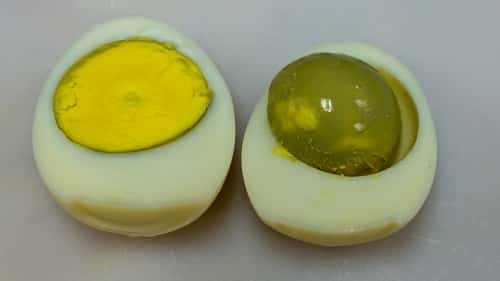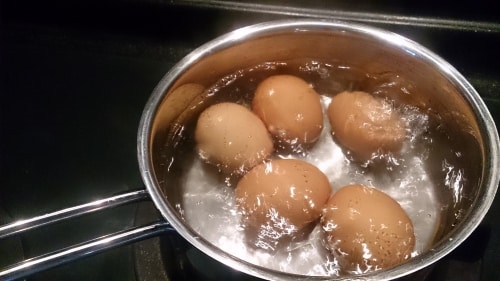
We’ve all put food on the stove and forgotten about it before. You may have put eggs on to boil and left them for too long. Now you’re wondering if they’re still good to eat.
Read on because we have the answers for you! Bear with us though because it may get a little sciencey.
Boiling an egg to make a soft-boiled egg usually takes around 3 minutes, depending on the size of the egg. If you want a hard-boiled egg, you’d usually boil it for 5-10 minutes.
But what happens if you forgot about it and boiled it for an hour? Providing it didn’t boil dry and burn the pot, would it still be okay to eat?
Accidentally Boiled Eggs For An Hour
The Science Behind Boiled Eggs
The structure of an egg is mainly coiled-up protein molecules. Applying heat causes these proteins to uncoil and join together to form a kind of latticework. This is what turns a runny egg into a firm, cooked one.
The white of the egg releases a chemical called hydrogen sulfide (this is what makes eggs stinky). This reacts with iron in the egg yolk and forms iron sulfide in a layer around the yolk.
This is what causes the greenish layer that you see with overcooked eggs. The longer the egg is boiled, the more iron sulfide is made, and the greener the yolk will be. Also, the egg white may turn a light beige color as the glucose in the egg caramelizes.
Boiling an egg for too long causes it to release moisture because as the proteins in the white clump together, the moisture gets squashed out.
If the eggs spent too long in the boiling water, this moisture release combined with the heat stress and movement against the saucepan may cause the shell to crack open.
Are Overcooked Eggs Safe To Eat?
Now that you know what happens when you overcook eggs, let’s look at whether or not they’re safe to eat. Yes, they’re safe in the sense that they won’t make you sick.
The boiling water and sealed shell prevent any bacterial contamination. The green yolk is safe because it isn’t “off”. The egg as a whole may be more rubbery than usual though so it won’t be appetizing to eat with toast, for example.
If you don’t want to waste it, we suggest mashing them and turning them into an egg salad sandwich.
To conclude
We hope this has set your mind at ease about eating your overboiled eggs. To prevent this from happening in the future, we recommend using this method of hard cooking instead of hard-boiling:
Use a wide-based pot so that your eggs can lie on the bottom in a single layer. Cover them with a couple of inches of cold tap water. Put the lid on and bring the water to a boil.
As soon as it’s boiling, turn off the flame and leave the lid on. Allow the eggs to stand in the pot of hot water for the following amount of time:
- 12 minutes if the eggs are medium
- 15 minutes if the eggs are large
- 18 minutes if the eggs are extra large
Drain the eggs and fill the pot with cold water. This prevents the formation of the green ring around the yolk. If you aren’t using the eggs immediately, you can store them in the fridge but please use them within a week.


